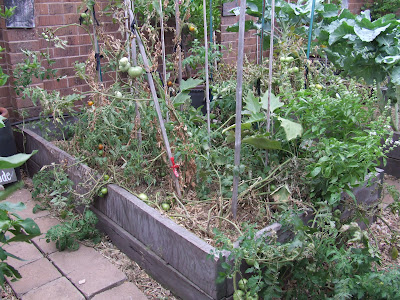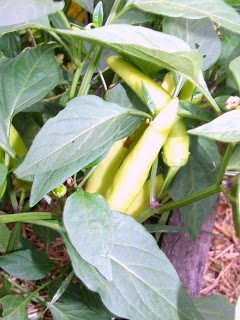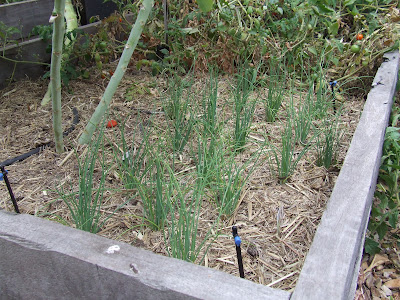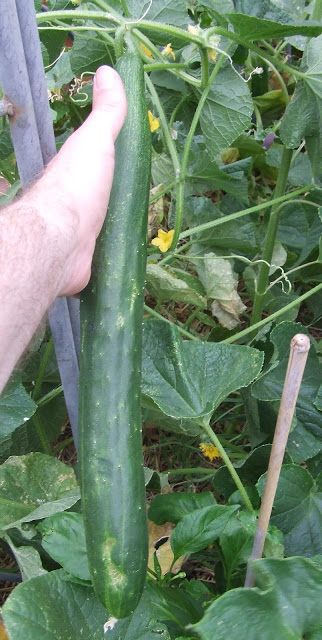Having been an avid food gardener for quite a while, one is bound to unlearn a few lessons. The consequences of them always tend to bite you on the bottom a little further down the track.
This season, I have made a couple of mistakes that have limited plant growth and are giving me sub-optimal rewards/harvests. The two main relapses in learnt knowledge are lessons that I learnt in my very first year of food growing in 2007. These two lessons are Mulching, and Timing and here is a bit about the consequences so far this year.
Temperatures in January and February have been in the mid 30’s C (90’s F) and the soil has been drying out rapidly with no rainfall to speak of since Christmas day. When I planted in late November, I failed to mulch heavily on 4 of the 5 main raised beds and have definitely noticed the difference in growth and quality. Each bed has a light layer of mulch of about 1 cm, which is just not enough when things heat up here in our climate. The saving grace that has helped avoid total ruin is that all of these beds are drip irrigated, alternating between harvested and mains water. Because I know that all beds are getting the same amount of water, I can see the effects upon the growth of the vegetables compared to the bed that I did mulch heavily with about 7cm (2 1/2 inches) of straw. The cucumbers and chillies in this bed are cropping heavily and look healthy. However the non-thickly mulched beds are dryer and the veggies within it, even though they are still growing, do not look half as healthy and are cropping lightly. The soils in each bed are identical in structure and are about the same pH.
 |
| Straggly looking tomatoes due to lack of mulch. |
So to remedy this issue, with the obvious solution of adding more straw to the beds, after I cleaned out the chook house on Monday night, I took their bedding which consisted of sugar cane mulch and chook poo, and added masses of it to each of these lacking beds. In just 6 days the transformation has been amazing. The soil in each bed is staying moist, and there is new growth on the veggies in those beds, which are flowering again. I wish I had have been paying more attention! I am but human and have re-learnt the lesson of mulching.
 |
| Healthy and abundant Long Yellow Chillies, well mulched |
The other problem/mistake that I made is one of timing. Planting the right plant at the right time. This issue stems from my lack of time management early in September when things around here were chaotic, hence the “More maintenance, Less projects” goal for this year. My spring planting did not actually occur until summer, and by that time it was getting hot and dry. Not ideal conditions for planting veggie seedlings, now is it? I didn’t even have time to grow my own seedlings, and admit that I bought them from a nursery or go without a crop.
So the consequences, which at this late stage, I cannot fix, are late crops, low productivity, and I do not have the weather to plant successive crops like I normally could. It also prevents you from planting early winter season crops like cabbage, garlic and onion, which need a long time to develop fully before hot weather hits again. I might just have to bite the bullet and pull summer crops out early before their full potential, and suffer the heartbreak. Saying that, I will probably be well over zucchinis by then!
 |
| Late planted Spring onions |
It just goes to show that even a seasoned food gardener like myself can make mistakes and learn from them. In fact the beauty of food gardening is that I am still learning new things each and every season.
 |
| The longest and straightest Lebanese cucumber I have ever grown! |
Mistakes only become an issue if you do not learn from them and keep repeating the same bad techniques over and over. Lets hope it never gets to that!

Hello Gavin,
Not that I can grow anything much, but my sister
is an amazing gardener, so I am just mentioning that she said to becareful with all the coffee grounds as they are great fertilizer, but they encourage leaf growth. I learned the hard way, when all my tomatoes in the greenhouse had lots of growth but almost no flowers. She said it was the coffee grounds that I brought home from Starbucks. I would think that that would be great for some plants such as leafy greens, but not so great for plants that flower.
Your garden looks great. We have a very short growing season despite the warmer winters. It still gets frosty until early June and starts again in September.
Barb
Hi Barb, thanks for the tips about coffee grounds. I will take your advice and only feed them to the worms and compost bin, unless I want some leafy growth for things like spinach or silverbeet. Hope it is starting to warm up in your part of the world.
Gav, thanks for the timely reminding about mulching. I am just in the swing of trying to get things up and running again and hadn’t really got around to mulching. With high temperatures expected on the West here again later this week, mulching is a must. Thanks again.
No problems! Happy to help, BM
Ahhh Gavin, you are not alone. I made the same mistake this year and although we have not had the 30 degree days here in NSW that you have, one 36 degree day at the beginning of last week has seen the end of most of my summer veges. Just the cherry tomatos remain with a few cucs and the beans are straggling along with the last zuc.
Needless to say, I started cleaning out and redoing the garden today.
Hope your do-over rewards you with another summer crop!
sometimes we have to relearn…mulch is a wonderful thing though isn’t it?
Yes, the old brain ain’t what it used to be!
My problem with mulching is that it attracts voles (little meadow mice-y critters not to be confused with moles) that make tunnels and eat root crops. If I mulch, everything stays moist but I get voles. If I don’t, like you, my beds dry out and things don’t do so well. Since I still have lawn, I’ve thought about spreading straw on the grass, then mowing over and bagging it. Maybe if the straw was chopped and mixed with grass clippings it wouldn’t be as enticing to the little beasties.
Those voles sound like a pain in the …. The only thing I have to contend with in the mulch are earwigs (an insect), but I am able to control them organically without much fuss. Besides the chickens love to eat them so no great loss except for the odd seedling.
I aim for 30 cm, a whole foot, of mulch by the start of summer. Intention and execution aren’t always the same :), but I do usually get at least half that everywhere, and it makes a huge difference to productivity. Kathy P, your voles sound a bit like our bandicoots. Although bandicoots eat worms, not roots, they dig everything up. The only way I’ve found to deal with them is fencing. Otherwise, if I water and mulch a bed, they dig it up, and if I don’t, I can’t plant anyhow.
Linda, what a coincidence that you should comment. I just finished reading your permaculture book which I really enjoyed. I wish I had have read it before I constructed my food garden!
On your mulch depth, I realise that you receive a lot more rain in northern NSW, so that thickness wouldn’t be an issue. However, when we get rain it is usually light between 1-5mm, so only the mulch would get wet and not the soil. It either drizzles or pours in buckets! Thank goodness that the raised beds have a brick wall that protects them from the harsh westerly summer sun.
Gav